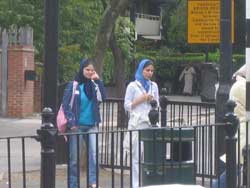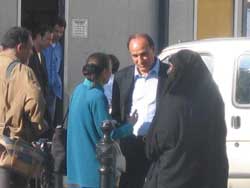|
From 10 am this morning, some of my friends and I went along to the polling booths set up by the Islamic Republic in London. We started by going to the Islamic Centre in England, based in Kilburn.
We talked to some of the people who were turning up to vote. Basically the voters fell into three categories.
1) Those who had official positions in the Islamic Republic, either embassy staff, numerous “cultural” centres staff, state TV etc. This category were unwilling to talk to us and in some cases some minor physical confrontations occurred, usually broken up by the intervention of the British police guarding the polling centres.
2) The second category was an eye opener even to us. These were affluent Iranians whose mode of dress suggested they were not the standard religious type supporters of the Islamic Republic. The women in this category had their head scarves pulled right back showing most of their hair, they wore heavy make up, designer clothes and jewellery and all drove expensive cars. The men in this category especially the young men, had the latest fashionable haircuts, again designer clothes and almost all of them we saw were driving expensive cars. Were we to see those in this category anywhere else we would have been very surprised to identify them as Islamic Republic supporters. Those in this category seemed to have economic ties with the Islamic Republic. For example some of them we identified as Persian groceries and supermarket owners in London who depended on export facilities from Iran to bring in their goods.
We saw many of the women in this category take off their scarves in the side streets after they had voted.
Basically my conclusion from observing this category was that by supporting the Islamic Republic they would enjoy economic benefits without any penalties but opposing the mullahs would mean they would have to pay in some way, however minor. To them their comfort and their luxuries is the number one priority.
3) The last category were those who did not support the Islamic Republic but were fearful of the consequences of not voting. One young girl said she was in London for medical reasons. She feared that if she didn’t vote, the authorities would stop her expenses at cheaper exchange rates. We sympathised with her and said we yearn for an Iran where all Iranians would be able to receive their medical needs without having to go to another country. Others thought if they didn’t vote they would not be able to go to Iran for their cheap holidays and visit their families.
Most interesting case was a middle-aged woman. She told us her son was 16 and against the mullahs, her husband was also against the mullahs but she had come to vote for Imam Zaman (The Lord of All Ages, the 12th Shiite Imam believed by Shiites to be in hiding and return one day to cleanse the world of sin), when I laughed and told her, but dear lady Imam Zaman is not a candidate in this election, she replied “but that’s who I vote for, I have voted four times and I always write Imam Zaman on the ballot card”!
Of the famous Iranian personalities, we saw the Iranian writer and the BBC Persian services associate journalist, Massoud Behnoud going along to vote with a younger woman. He was not very comfortable meeting us there, but told us he was voting for Moin, since he was the reformist candidate. I asked him hasn’t 8 years of Khatami been enough for him to realise that reform was not possible within the framework of the Islamic Republic? He said on the contrary we have gained so much under Khatami, most notably the way our people think has changed. I said if we have gained anything it has not been because of Khatami but because of the struggle of people, like the student uprising in 1999. Behnoud said “you weren’t even there in July 1999, I was there and I was making speeches for the students”. At this point two of my friends who were with me and were involved in the July 1999 uprising cut him short and said, “Mr. Behnood what speeches? You came once and told us to stay in the university and refrain from shouting radical slogans” Behnood not realising that they were witnesses with me from the 1999 uprising who knew exactly what his role was, tried to change the subject and then refused to discuss the matter further.
Later one of my friends who was with me at the time had an interview with VOA and mentioned that Behnood had turned out to vote. We were then told that Mr. Behnood had rang immediately after the interview and denied that he had voted today. I have my opinion on what the right thing to do was in these elections and Mr. Behnood is entitled to his but, I was really repulsed by his utter lie. To me this was a blunt example of how the intellectuals of his generation lied and continue to lie so easily to the people.
We also had a phone call from Mehdi Jami, another BBC Persian service staff who accused us of undemocratic terror tactics against the voters. I am baffled as to why he thought this way. After all we had not physically stopped anyone from voting or threatened anyone, we basically wanted to find out and understand the reasons why some of our compatriots still took part in the Islamic Republic elections. If anything perhaps Mehdi Jami who thinks he is a journalist should for once do what a news reporter should do, i.e. go out there find news and report it.
BBC Persian service also refused to report and cover the hunger strike staged outside the Iranian embassy in London by three student activists and a war veteran. ===============
|


